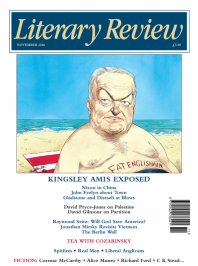Richard Overy
The Moral Low Ground
Europe at War, 1939–1945: No Simple Victory
By Norman Davies
Macmillan 487pp £25
I realised almost as soon as I began reading Norman Davies’s new history of the Second World War in Europe that I was not the best person to review it. In his introduction he says, without a blushing aside, that when he is invited to talk about the war he often asks his audience whether they know its five largest battles, or the different ideologies involved, or the state that suffered the most dead. He tells us that his audience is usually reduced to a shy silence, followed by spontaneous, but usually wrong, guesses as to the responses he is seeking. This book is intended to be salvation for these many lost souls. But for those, like this unfortunate reviewer, who know the answers, the book must be at best a happy reiteration, at worst a redundant catalogue of established fact.
To be fair, Davies has in his sights not just the average audience whose understanding of the war has been coloured by years of myth-making and distortion. He also wishes to correct the historical profession, which has clung for too long to an outmoded view of the Second World War:

Sign Up to our newsletter
Receive free articles, highlights from the archive, news, details of prizes, and much more.@Lit_Review
Follow Literary Review on Twitter
Twitter Feed
Although a pioneering physicist and mathematician, Blaise Pascal made it his mission to identify the divine presence in everyday life.
Costica Bradatan explores what such a figure has in common with later thinkers like Kierkegaard.
Costica Bradatan - Descartes Be Damned
Costica Bradatan: Descartes Be Damned - Blaise Pascal: The Man Who Made the Modern World by Graham Tomlin
literaryreview.co.uk
The era of dollar dominance might be coming to an end. But if not the dollar, which currency will be the backbone of the global economic system?
@HowardJDavies weighs up the alternatives.
Howard Davies - Greenbacks Down, First Editions Up
Howard Davies: Greenbacks Down, First Editions Up - Our Dollar, Your Problem: An Insider’s View of Seven Turbulent...
literaryreview.co.uk
Johannes Gutenberg cut corners at every turn when putting together his bible. How, then, did his creation achieve such renown?
@JosephHone_ investigates.
Joseph Hone - Start the Presses!
Joseph Hone: Start the Presses! - Johannes Gutenberg: A Biography in Books by Eric Marshall White
literaryreview.co.uk